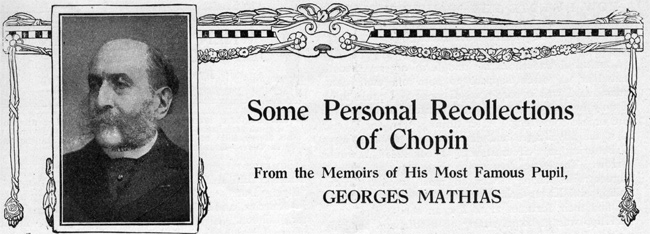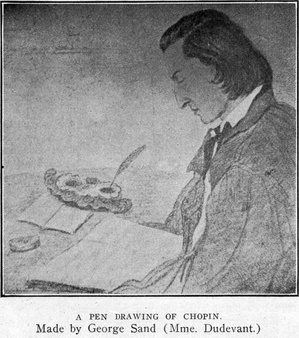
[There is always something Sphinx-like about Chopin. He was so silent with his tongue and so eloquent with his music. A few personal letters and a few slim volumes of piano music are all that we have of Chopin, the dreamer, tone-poet, sick man and genius. How little compared with the volumes of personal literature and the Titan operas Wagner left us! How little, and yet how much! We are forced to turn to the writings of his contemporaries if we would know him as he really was, and in this we are more fortunate, as Liszt, Mendelssohn, George Sand, and many others equally distinguished, have written about him freely. The present article is by far the most eminent of Chopin’s pupils. Georges Mathias (1826-1910) was also a pupil of Kalkbrenner, and a graduate of the Conservatoire, where he subsequently became professor of the piano (1862-87). The article appeared in the Exercise Quotidiens of Isidor Philipp, and is here translated and reprinted from the French journal Musica. Mathias was a Chopin enthusiast, and like many of his kind a somewhat blind hero-worshiper. Nevertheless, he was an interesting personality, and the article not only gives a glowing description of Chopin, but also affords us a fascinating glimpse of Georges Mathias.—Editor of The Etude.]
 I remember having witnessed Chopin in a violent rage concerning a pedal point in Liszt’s transcription of Adelaide; a pedal point of a frightfully commonplace kind—an unlovely blemish by Liszt tacked onto a marvelous melody by Beethoven. Chopin chanced to receive the copy of the Gazette Musicale in which this transcription first appeared, and his resentment would not die out. He could not forget this unfortunate pedal point; he raved, and raved! His indignation seemed to be tempered by regret for his ancient brother-in-arms, his long-loved friend; but at this time Chopin and Liszt had separated from other causes.
I remember having witnessed Chopin in a violent rage concerning a pedal point in Liszt’s transcription of Adelaide; a pedal point of a frightfully commonplace kind—an unlovely blemish by Liszt tacked onto a marvelous melody by Beethoven. Chopin chanced to receive the copy of the Gazette Musicale in which this transcription first appeared, and his resentment would not die out. He could not forget this unfortunate pedal point; he raved, and raved! His indignation seemed to be tempered by regret for his ancient brother-in-arms, his long-loved friend; but at this time Chopin and Liszt had separated from other causes.
Chopin the pianist? Only those who listened to him can rightly appreciate the fact that nothing has ever been heard approaching his playing. His playing was like his music. What virtuosity! what power—yes, power!—but this lasted only a few measures; and the exaltation! the inspiration! the whole man was vibrant! The piano itself seemed to be intensely alive! How could one fail to be thrilled by it! I repeat, the instrument one heard when Chopin played has never existed except under the hands of Chopin. He played as if he were composing….
When playing to ladies, Chopin surpassed himself, and if they were titled, you may be sure he played none the worse. Undoubtedly he had a predilection for the aristocracy, but no one has any right to throw stones at him on this account. It was one of the natural characteristics of his instinctive refinement; he was a lover of pretty dresses, white hands, and rosy cheeks. Was there ever anything more delicious than Chopin’s playing in the midst of his circle of fair friends—a veritable Decameron—whom he immortalized by his dedications? The audience was worthy the artist.
I first knew Chopin in 1840, at No. 38, Rue de la Chaussée d’Antin. This has since been destroyed by the intersection of the Rue Lafayette. Later he was at No. 5 Rue Tronchet; you can still see the window blinds on the ground floor from the street: nothing is changed. At my first visit (I was fourteen years old) I played a piece by Kalkbrenner, my first teacher: a little piece entitled Une Pensée de Bellini. Chopin listened to this horrible music in perfect calm, without a trace of superiority, and accepted me as a pupil. He gave me some études of Moscheles to commence with (Chopin himself played No. 3 in the second book marvelously) and the concerto in A minor (Hummel’s, of course). On one occasion Chopin was sick, and Fontana received us. He played the first Ballade—in those days it was the music of future—and neither I nor my father, who was a good musician, could understand this great work.
One day when Chopin was sick and bedridden, but still able to receive us, I noticed on his table a copy of Schumann’s Carnaval, the first edition of Breitkopf, with a lithographed title-page. My father asked Chopin what he thought of the work, and he replied with excessive coldness, as if the music of Schumann were painfully distasteful to him. This was in 1840, and the Carnaval was published in 1834. As I come to think of it Chopin was not only completely indifferent to Schumann’s Opus 9, but he appeared to have not the least desire to know it. This was because Chopin was classic in his tastes and opinions; all that savored of romanticism or untrammelled imagination was as nothing to him. He was only a man of genius. That is to say, Chopin was extremely simple. I do not mean simple-minded, but simple in that he was neither littérateur nor critic, not of the same type as Berlioz or Liszt. He was a soul, not a psychologist. The psychologists can readily show us the machinery of a soul, but they have no souls of their own; they are surgeons.
CHOPIN READ LITTLE.
In spite of George Sand, Chopin remained a stranger to the literary world. He read little except the work of Polish poets such as Mickiewicz, a volume of whose poems I saw on a table in the salon, a copy of Marya Pan Padeusz. Chopin was an ardent patriot, and all his earnings found their way into the pockets of Polish emigrants. As I have already said, he read scarcely anything, and he has never been known to have written French.
I also saw, in a magnificent case, a cup presented to him by King Louis Philippe one day when he played at Saint-Cloud in company with Moscheles. Chopin and Moscheles—a queer combination! I saw the latter in London in 1839, and heard him express his disapproval of the hand-stretches of a tenth so frequent in Chopin’s music. These intervals distressed Moscheles, who regarded them as needlessly difficult. I played four-hand pieces with him. He was already an old man but still retained some of his old-time greatness.
I have had before my eyes the original manuscript of the second book of études, dedicated to Mme. d’Agoult, the mother of Mme. Richard Wagner—a small, delicate script, delicate, very delicate, clear, neat and characteristic.
As Chopin often received his friends while giving lessons, I once heard M. de Perthuis, aide de camp to King Louis Philippe, say, “Why don’t you write an opera?”
“Ah, M. le Comte,” replied Chopin, “let me compose music for the piano; it is the only thing I understand.”
And his polished shoes? The most glittering I have ever seen. He had very small feet. And he always wore a double-breasted frock-coat, buttoned high and cut in the latest style. He was invariably most fashionable and distinguished. One always heard of him as being “dressed to the nines.”
Shall I speak of Chopin the composer? I do not wish, at this late date, to pose as a music critic. When has a magazine article ever been able to give the least idea of a painting or piece of music? Is it not the vainest of literary tasks?
Chopin received little aid from without. All that he has written is his own. His temperament and his personality; these are the two factors of his marvelous genius. Bach, Hummel and Field may be mentioned as having influenced his music. It is not just to deny him variety, as many of his critics have done. He touched the whole gamut of emotion; the entire range of sentiment, tenderness, melancholy, exaltation, ardor, enthuiasm (sic), heroism … Have you ever noticed that pure music can never express wickedness or baseness? (Naturally I do not include theatrical music.) It is true that music can be vulgar and trashy … but we are thinking of the nobility, the heroism of the Polonaises, the unprecedented richness of ideas and the limitless imagination of the Ballades; of the tenderness, the charm, the awe and mystery which are to be found in the nocturnes. Oh, those Nocturnes! Tones of infinite sadness! There is music in them which fathoms the depths, which plunges us into the immensity; emotional force that rends our hearts; horrible despair, bordering on the overwhelming immanence of death itself (Op. 27); divine ecstasy interrupted by a wail of sorrow, and again by a soft caress. And all is so sincere; the sincerity of one whose heart bleeds; whose soul is overflowing with tenderness!
I seem to see again that face with its fine characteristics, its pure outline, the small, clear eyes, brilliant and transparent: the lips which when parted disclosed teeth of dazzling whiteness, the smile of inexpressible charm. As the man was, so was his music. Never was there such a complete union between an author and his work.
CHOPIN AND KALKBRENNER.
I also recollect Chopin at the Erard concerts and his encounters with Kalkbrenner: the conversations between the two men who were the very antipodes of each other. They had only one thing in common—each of them had the bearing of a perfect gentleman. Ah! they had yet another point of resemblance. Both of them wore their clothes buttoned high, after the fashion of their day; only Chopin’s buttons were always black, while Kalkbrenner invariably wore buttons of gold. How curious it is to remember that the fellow- countrymen of Chopin found him happy to be in Paris because he could benefit by the instructions of Kalkbrenner! It is the more singular because this heavenly tone-poet also possessed a technique of the highest order. Perhaps no one has contributed more than Chopin to extend the domain of the pianoforte. At the examinations of the Conservatoire, when one turns once more to his works, there are some who cry, “Chopin, again! Always Chopin!” Yes, indeed! because in his works one finds all things—practical utility and poetry, body and soul, material and ideal!
He was so sensitively organized that, like the X-rays, he saw a thousand things where others see only one. He plunged boldly forward where others hung back in doubt. He suffered where the greater part of humanity remain unmoved. He was one of those who are born to bring joy and happiness to their fellow- creatures, but at the price of a life of suffering, of a life stricken down even while its fairest flower is in blossom. His genius inspired him—and consumed him.



